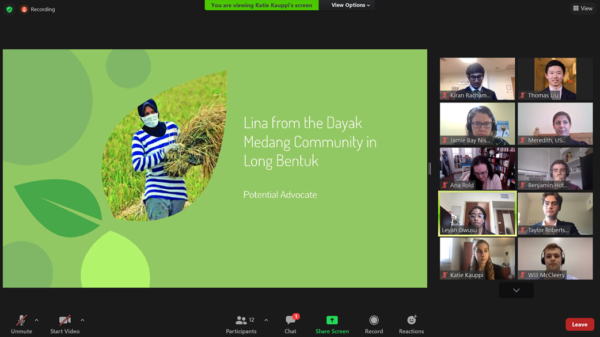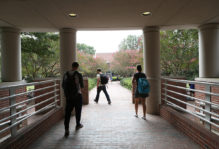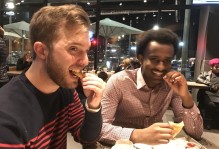“We Were Able to Dream Big” — Reflections on the Fifth Annual WMGIC
By Kiran Rachamallu ’23, WMGIC V External Relations Director
For 24 hours from March 19-20, 2021, 120 students across 15 universities participated in the fifth annual William & Mary Global Innovation Challenge, WMGIC V. At the start of the competition, student teams receive information about a pressing international issue, for which they will develop solutions throughout the event. Learn more about all 30 innovative presentations.
Collaboration across disciplines helps to make WMGIC successful, since students with varying subject specialties or levels of experience can exchange ideas. This mission aligns with the Global Research Institute, which engages students in multidisciplinary research projects and exposes them to a range of perspectives. GRI served as a platinum sponsor of this year’s event, along with the William & Mary Institute for Integrative Conservation, the William & Mary Green Fee, and the Cohen Career Center, among others.

At the end of the event, teams presented their strategies virtually to a panel of expert judges.
The WMGIC executive team caught up with the top four winners of this year’s event, who were the finalists in each problem-solving stream: Governance, Social Entrepreneurship, Technology, and Business Consulting. Read on to hear what team members had to say about their thought processes during this year’s event.
Grand Prize Winner – BAFKIN International Associates
Team Members: Nathan Liu ’22, Kshamata Neupane ’22, Fatima Pate ’23, Bennett Hawley ’23, Alice Li ’22 (William & Mary; University of St. Andrews)
Stream: Business Consulting
Cash Prize: $1,500
Recognizing the economic, environmental, and social complexities of the palm oil trade, BAFKIN Associates sought to leverage the investment and consumer base of Whole Foods and Amazon to maximize our global impact. Our plan involves creating a palm oil certification scheme in partnership with Rainforest Alliance, piloting a vertically-integrated supply chain in Kalimantan for the Whole Foods 365 and Amazon Essentials product lines, and launching a land buy-back program to support women, indigenous, and minority small-scale farmers and entrepreneurs.
Through WMGIC, we got the chance to practice the theories and skills learned in the classroom in a collaborative environment, with the support of skilled professional mentors and judges. We all come from different academic backgrounds, and we appreciated the chance to learn about each other’s strengths. Our different skill sets complemented each other and helped us succeed. WMGIC forced us to condense the research, idea generation, and problem-solving processes to accommodate the 24-hour timeframe. By removing the pressure of creating implementable solutions, we were able to dream big and spotlight opportunities we would have missed.
Second Prize Winner – Data Dreamers
Team Members: Kimya Shirazi ’22, Merielyn Sher ’22, Joseph Lee ’24 (William & Mary)
Stream: Technology
Cash Prize: $1,000
Largely motivated by an already-existing native Indonesian blockchain-based technology startup, HARA, we sought to expand the growing and promising amount of data in this project to include a predictive modeling service that can detect illegal palm oil plantations in Kalimantan. We tried approaching the regulatory oversight of the palm oil industry in Kalimantan through different technological angles. We initially struggled at honing a specific technology and a specific use case for technology, but through our research, we came across HARA, and then we were able to find a directly-related research paper.
We thought that the abundance of agricultural data that HARA already had could be used to first build an interactive map to provide a comprehensive picture of the palm oil industry to the general public. Potential customers and humanitarian organizations could use this publicly-available data to clearly distinguish between legal and pre-identified illegal palm oil plantations. As more data is collected, a predictive model could be trained to detect what exactly qualifies a ripe plantation, and therefore predict locations of future palm oil plantations — providing insights to law enforcement agencies and allowing them to more effectively identify potential illegal plantations. By making the process of identifying illegal palm oil plantations faster and cheaper, the Data Dreamers hope to help with tackling the environmental and humanitarian issues that come with these illegal practices.
Third Prize Winner – The Collective Good
Team members: Ariana Gueranmayeh ’22, Alec Scicchitano ’21, Erica Harp ’21 (University of Virginia; George Mason University)
Stream: Governance
Cash Prize: $750
Our project involved a three pronged solution to create a more sustainable palm oil industry in Kalimantan. First, we designed a program for community advisory boards, so Kalimantan community members would have increased agency in making decisions surrounding the palm oil industry. Second, we developed an auditing scheme to ensure that palm oil plantations were following existing regulations, with significant community involvement in the auditing process to act as a mechanism against auditing corruption. Finally, we developed an education and loan program to help individuals and families within Kalimantan Our goal was to more deeply integrate members of the community in the policy making process.
Our project was inspired by the diverse academic disciplines of our group members. Among the three of us, we were able to harness knowledge from policy, education, and public health to develop a project that considered all aspects of the issues with the palm oil industry at the community level. All of us study and think critically about issues of policy and international development, so we were eager to apply our knowledge and skills in a collaborative setting. We knew we wanted to center community voices at the foundation of our project because this bottom-up approach has not been used enough in development policy. We firmly believe that we need to move away from the top-down approach that has dominated policymaking. When we instead implement policies that reflect the genuine needs of the communities the policy affects, then more meaningful and lasting results can ensue.
Fourth Prize Winner – Global Development Guild
Team Members: Laura Lam ’24, Lilly Doninger ’24, Joshua Murray ’24, Redeit Hailu ’24 (William & Mary)
Stream: Social Entrepreneurship
Cash Prize: $500
As the palm oil industry continues to grow at an ever-increasing rate, the autonomy of independent smallholder farmers is at risk. Additionally, independent smallholders’ current unsustainable farming practices greatly harm the environment. Recognizing this fact, we sought to create a way to protect farmers’ independence while also encouraging sustainable agriculture. The GLD foundation is a private foundation funded by Earth Balance, an MNC dedicated to sourcing sustainable palm oil. Our foundation would allocate financial resources and require educational training to smallholder farmers in order to convert their farms to sustainable ones. Earth Balance would then receive first purchase rights of the 100% sustainably farmed palm oil. We believe that our approach would create a closed loop, incentivized structure to benefit stakeholders on all levels of the supply chain while also helping to maintain a healthy environment.
We never expected to win or even produce a project idea of actual impactful value. The whole experience of WMGIC gave our team immense amounts of self confidence and inspiration for future careers and passions. WMGIC taught us about the importance of tackling very specific problems with solutions that can have a transformative impact on a sector as a whole. We thought it was really cool to see how a single issue could be approached from so many different perspectives. WMGIC sharpened our research and oral communication abilities and taught us how to quickly, persuasively pitch an idea.
Comments are currently closed. Comments are closed on all posts older than one year, and for those in our archive.




Thank you! Learn more about WMGIC at https://www.wmgic.org